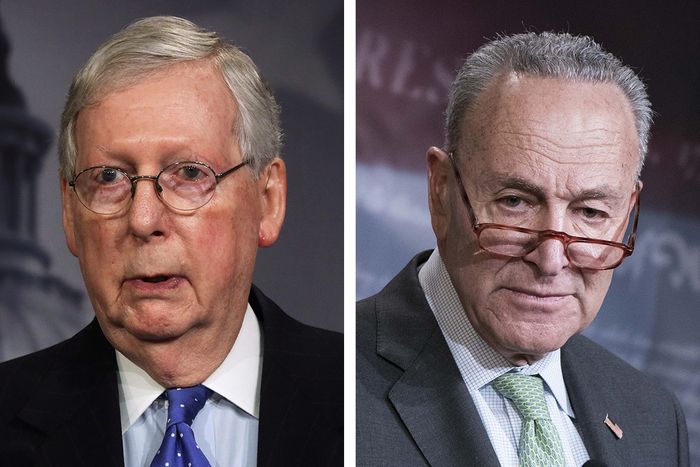
In the wee hours of Wednesday morning, after lots of wrangling and threats and a premature celebration by the stock market, congressional and administration negotiators reached an agreement on a $2 trillion emergency relief package to counter the immediate and long-term economic impact of the coronavirus pandemic. The bill was initially modeled on a Republican plan that focused on getting onetime relief checks out to individuals along with massive loans for endangered companies. But congressional Democrats managed to secure a number of improvements, most notably oversight for the corporate relief, direct aid for hospitals ($130 billion) and state and local governments ($150 billion), and beefed-up (an extra $600 per week) and extended (four months) unemployment insurance benefits.
The final version of some of the provisions Republicans initially proposed includes immediate payments of $1,200 for individuals and $2,400 per couple, plus $500 per child (beginning to phase out at $75,000 per individual or $150,000 per couple of adjusted gross income); a $500 billion business-loan fund with oversight from an inspector general and a congressional panel (a major change from the first draft, which put the Trump administration in charge of the money); and a separate $367 billion loan fund for small businesses.
Details won’t be available until sometime later on March 25, and actual bill text may barely be done before Senate and House votes, so there are many items of dispute whose conclusion remains unknown at this early point (e.g., Democratic proposals for funds to help state and local government move toward voting by mail for the general election). Some late-night compromises did leak out, per the Washington Post:
Final issues included a push by Democrats for a dramatic increase in food stamp benefits in exchange for accepting billions more in funding for the administration’s farm bailout that Republicans have included in the stimulus bill. Sen. John Hoeven (R-N.D.) said in a news release that the legislation would increase the amount the Department of Agriculture can spend on its bailout program from $30 billion to $50 billion.
The procedure for enacting this legislation remains hazy and could even become perilous. The Senate was expected to approve it first, probably on Wednesday, without a lot of dissension, since Mitch McConnell and Chuck Schumer were in the forefront of negotiations and together announced the deal on the Senate floor overnight. But as the day wore on, and final language was withheld on many portions of the bill, disputes broke out, notably over the unemployment insurance provisions, which some Republican senators consider too generous, Roll Call notes:
The delay appeared to be at least partly due to what Lindsey Graham, R-S.C., and other Republicans called a “massive drafting error” that could incentivize layoffs by providing unemployment compensation over and above replacement wages….
“If this is not a drafting error then this is the worst idea I’ve seen in a long time,” Graham said. Under the deal worked out with Democrats, jobless individuals would receive $600 a week for four months on top of their regular unemployment compensation, which varies by state. In South Carolina, the maximum benefit is $326 per week, so for four months an individual could get paid the equivalent of about $49,000 a year or $24 an hour, Graham said.
Bernie Sanders has threatened to push for tighter oversight in the bill’s corporate loan provisions if Republicans persist in nickel-and-diming the unemployed. It’s increasingly unclear when the Senate will vote. Another source of discord was a very public complaint by New York Governor Andrew Cuomo that the aid supplied shirked his hard-hit state.
While House Democratic and Republican leaders participated in the negotiations and presumably signed off on the final product, the House is not currently in session, and given coronavirus fears, many members would prefer to keep it that way and enact the stimulus bill by unanimous consent or a voice vote. The odds are low that all 435 members will agree to the bill (scattered objections are likely to come from both the left and the right), but a voice vote might accommodate both dissension and quick passage without a formal reconvening of the chamber. The possible post-negotiation evolution of the bill’s provisions in the Senate, however, could cause problems in the House.
Chief administration negotiator and Treasury Secretary Steven Mnuchin said during the night that President Trump would “absolutely, absolutely, absolutely” sign the bill. This triple assurance was necessitated by the president’s tendency to undercut his agents (e.g., in the appropriations discussions that led to the 2018–19 government shutdown), but even he wouldn’t mess around with this huge, urgent, and fragile deal.
Now attention can shift back to the pandemic itself, with jittery lawmakers monitoring their own health (three members of Congress and multiple staff have tested positive for COVID-19) and the adequacy of their hasty relief efforts.
This item has been updated.






























